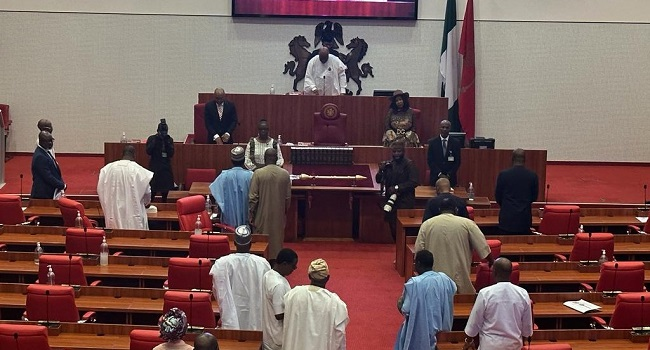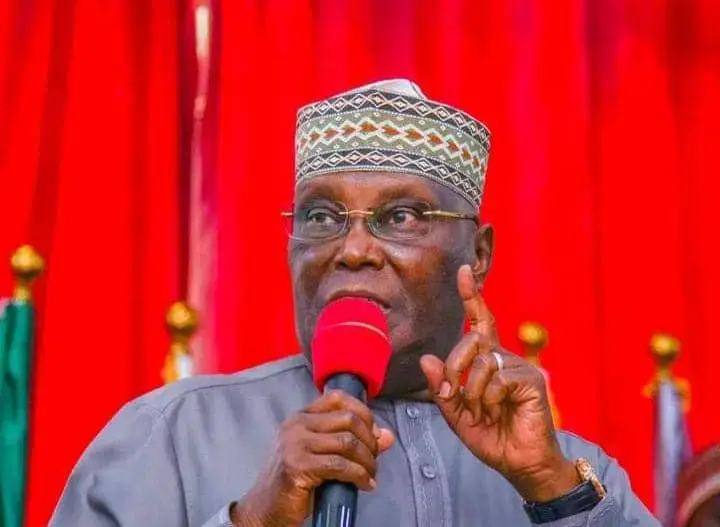….Adds N1.2trn, Tinubu Signs Budget Today
Defence, Education, Health Top Budget
…NASS Recreation Centre, Car Park
Gulp N10bn
… Why we increased budget by N1.2Trn – Appropriation Chairmen
…. Reps consider 962 bills, 500 Motions, 153 petitions in six months
By Abubakar Yunusa
The National Assembly on Saturday passed the 2024 budget of N28.77 trillion, jerking it up by N1.2 trillion than the initial submission of President Bola Ahmed Tinubu.
Tinubu had in November presented a total sum of N27.5 trillion proposed budget for 2024 to the joint session of the National Assembly, the National Assembly on Saturday passed a budget of N28.77 trillion.
The National Assembly increased the budget presented by President Tinubu by N1.2 trillion.
Against speculations in some quarters, the National Assembly disclosed that President Tinubu will sign the budget on Sunday.
Addressing newsmen shortly after the passage, the Chairman, Senate Committee on Appropriation, Solomon Adeola Olamilekan said that the 10th National Assembly would still maintain the January-December budget circle, adding that Mr. President can sign the budget anywhere in the country.
Explaining the reason behind the increment, the Senate said the difference arose from additional requests for some agencies after the initial proposals by the President.
Olamilekan said: “Through the close and harmonious appropriation process, the Executive forwarded a request for additional funding and some items of expenditure to the Committee which were not included in the Bill as submitted by the President. In order to accommodate the requests, the following adjustments have been made on the Bill:
* Foreign Exchange differential
*GOE’s Revenue Increased
*GOE’s Personnel reduction
*Service Wide Vote (Wage adjustment)
*Reduction from Service Wide.”
While the Senate also raised the exchange rate assumption from N750/USD to N800/USD, it adopted the oil price benchmark of 77.96 US Dollars per barrel and daily oil production estimate of 1.78 million barrels per day.
The budget deficit remained N9.18 trillion just as assumption on GDP growth rate remained 3.88 per cent.
The budget as passed include aggregate expenditure of 28.777,404,073,861 trillion, statutory transfers of N1,742,786,788,150, and capital expenditure of N9,995,143,298,028.
The sum of N9,178,930,385,914 is voted for aggregate financing items which include, the sum of N7,828,529,477,860 trillion for Debt financing. Asset sale/privatization is N298,486,421,740 billion. Multilateral/bilateral project-tied loans is N1,051,914,486,314 trillion.
The Senate, however, noted that “the 2024 Appropriation Bill was presented to the National Assembly late, adding that “this is against the Fiscal Responsibility Act which requires the Bill be presented not later than three (3) months before the next financial year, which puts intense pressure on the processing of the Bill.”
It recommended that to ensure thorough scrutiny of budget proposals, the executives should henceforth comply with the provisions of the Fiscal Responsibility Act.
The senate asked that the Executive should ensure compliance with the provisions of relevant/extant laws as it concerns GOES
It also stated that agencies removed from the FGN budget should step up their revenue generation, fund itself and remit more to the Consolidated Revenue Fund.
Olamilekan, while addressing newsmen also said that the lateness of the presentation of the budget is the reason for the fire brigade approach, adding, “the President will sign the budget before 1st January.
“There is no law that prevent the President from signing the budget on Sunday. And it can be signed from anywhere.”
He explained that they involved the executive on every stage, adding that a lot of work went into it before it was passed.
“For the President to sign, everybody was aware that we have no choice if we must maintain the January to December calendar. So, we harmonized it with the House of Representatives. This assisted us in quick collection of the report and the eventual passage,” he said.
Justifying the increase of the budget by N1.2 trillion, Olamilekan said, “what necessitates our actions is the removal of the fuel subsidy and the exchange rates, which Nigerians are paying dearly for.
“The increase in the exchange rate, is behind the increase in the budget. Area of oil prices and bench mark is also another reason why the budget was increased and not any ulterior motive.
“Also, NCC, NPA, NIMAS were agencies affected by exchange rate which made us increase the budget by N177 billion. If all is added, it amounts to N1.2 trillion, which is the reason the budget has been jerked up.
“Water resources and the school feeding funds also cause us to add N100 Billion to the school feeding Programme. This was done so that the budget will meet the yearning of Nigerians.”
The House of Representatives passed the same version.
Out of the total sum of N28.7 trillion, N1.74 trillion is for statutory transfers, N8.27 trillion is for debt service, N8.76 trillion is for recurrent (Non-debt) expenditure while the sum of N9.99 trillion is for contribution to the development fund for capital expenditure for the year ending 31 December, 2024.
Under the Statutory Transfer, National Judicial Council (NJC) got the highest allocation of N341.62 billion; followed by Niger Delta Development Commission (NDDC) with N338.92 billion; Universal Basic Education Commission (UBEC)- N263.044 billion; North East Development Commission (NEDC) – N131.836 billion; Basic Healthcare Provision Fund (BHPF) – N131.522 billion.
Also under statutory transfers; National Agency for Science and Engineering Infrastructure (NASENI) – N131.522 billion; Public Complaint Commission (PPC) – N14.460 billion; and N5 billion for National Human Rights Commission (NHRC) and Independent National Electoral Commission (INEC) -N40 billion,
For the National Assembly budget, the sum of N78.624 billion is for House of Representatives; N49.145 billion is for Senate; N36.727 billion for National Assembly Office; N30.807 billion for General Services; N20.388 billion for Legislative Aides; N15.189 billion for Service Wide Vote; N15 billion for National Assembly Hospital Project; N12.326 for National Assembly Service Commission (NASC); N12.123 billion for National Assembly Library Complex (Take-off Grant); N10 billion for ongoing construction of NASC headquarters; N9.008 billion for National Institute for Legislative and Democratic Studies (NILDS); N4.500 billion for completion of ongoing NILDS building.
The budget also have allocation of N4 billion for National Assembly Recreation Centre; N4 billion for Design, construction, furnishing and equipping of NASS Budget & Research Office (NABRO); N3 billion for procurement of books for NASS Library; N3 billion Senate Car Park; N3 billion for House of Representatives Car Park; N3 billion for upgrade of NASS key infrastructure; N3 billion for Design, construction, furnishing and equipping of NASS ultramodern printing press; N2.700 billion for furnishing of Committee meeting rooms & others offices within Senate building.
It equally allocate N3 billion for furnishing of Committee meeting rooms for House of Representatives Part I & II); N2.500 billion for NASS Pension Board (Take-off Grant); N1.230 billion for Office of Retired Clerks & Permanent Secretaries; N1 billion for Constitution Review; N130 million for Public Accounts Committee (Senate); N150 million for Public Accounts Committee (House); N200 million for Senate Appropriation Committee and N200 million for House of Representatives’ Appropriation Committee.
Out of the N5.451 trillion approved for Recurrent (Non-Debt) Expenditure, Ministry of Defence got the highest allocation of N1.308 trillion, followed by Ministry of Works with N892.46 billion, Ministry of Police Affairs – N869.121 billion; Ministry of Education – N857.134 billion; Ministry of Health & Social Welfare – N667.577 billion; Ministry of Interior – N362.552 billion; Ministry of Youth – N201.467 billion; National Security Adviser (NSA) – N199.763 billion; Ministry of Foreign Affairs – N140.456 billion; Ministry of Agriculture & Food Security – N110.248 billion; Secretary to the Government of the Federation (SGF) – N100.248 billion and Presidency – N97.913 billion
Under the capital expenditure, the federal ministry of works topped with N892.46 billion, followed by the federal ministry of agriculture and food security allocated N857.14 billion, ministries of health -N485.55 billion, finance -N463 billion, education -N 417. 57 billion, N339.28 billion, defence N339. 28 billion, N100 billion.
Why We Increased Budget By N1.2Trn – Bichi
The Chairman of the Appropriation Committee, Hon. Abubakar Kabir Bichi justified the increment of the budget by N1.2 trillion, saying it was due to revenue prospects from Government Owned Enterprises (GOEs) and inflation.
Addressing journalists after the budget was passed, Bichi said:”We have inflation and exchange rate for the dollar, the executive proposed N750 to the dollar, but after we studied carefully, we look at it , it is unrealistic.
“So we increased to N800. And also we had a meeting with the GOEs, we believe that their submissions is not enough. They have agreed to increase their revenue to N700 billion. That how we are able to get that N1.2 trillion, which we applied to capital.
“This is the first time the capital is bigger than recurrent. We appropriate about N850 billion, education, we gave them a lot of money. I believe this budget is brilliant and Nigerians will see a lot of impacts.
Reps Consider 962 bills, 500 Motions, 153 Petitions In Six Months
Meanwhile the House has in its six months of existence received and considered nine hundred and sixty-two (962) bills, five hundred (500) Motions, and one hundred and fifty-three (153) petitions.
Speaker Abbas Tajudeen who disclosed at the close of session for the year said of these numbers, one hundred and Twenty (120) bills have passed the Second Reading stage which are currently undergoing further review and refinement to address some of the concerns raised during the debates.
‘We have also successfully passed many other bills, which have been transmitted to the Senate for concurrence. Notable among these bills are the Electricity Act (Amendment) Bill, 2023, the Federal Audit Service Act (Amendment) Bill, 2023, 2022 Supplementary Appropriation Act (Amendment) Bill, 2023 and the Oath Act (Repeal and Enactment) Bill, 2023.
“Other critical bills passed by the House include the Control of Small Arms and Light Weapons Bill, 2023, Federal Fire and Rescue Service Bill, 2023, Administration of Criminal Justice Act (Repeal and Enactment) Bill, 2023, Niger Delta Development Commission Act (Amendment) Bill, 2023, Nigerian Medical Research Council (Establishment) Bill, 2023, Nigerian Peace Corps (Establishment) Bill, 2023 and more recently, the South East Development Commission (Establishment) Bill, 2023.
“Over the same period, the House received and resolved over 500 Motions, many of which brought to the attention of the House and the nation pressing matters affecting the people. I have always considered Motions to be one of the most potent tools of legislative representation.
“The House has made significant strides in fostering greater collaboration with citizens in all our key legislative activities. This has been achieved through engaging citizens in oversight, committee activities, and other legislative processes.
“These efforts have ensured that the voices of the people are heard and their inputs are incorporated into the lawmaking process. As noted earlier, in developing the Legislative Agenda, the House organised a citizens’ town hall whose inputs were incorporated into the final draft.”











